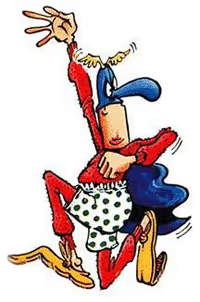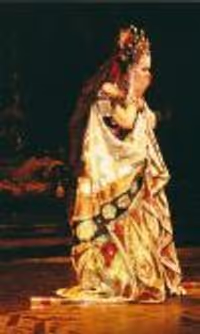Just back from seeing War Horse Film.
#25Just back from seeing War Horse Film.
Posted: 12/27/11 at 8:43pm
I saw the film today and can say that if the ending didn't remind you of GONE WITH THE WIND, you haven't seen GONE WITH THE WIND. I didn't have a problem with the ending but what I did have a problem with was the final auction scene. There was no need to to put the poor boy through that again in order to get his horse back. It really tried to unsuccessfully pull out more emotion from the audience and sadly I think that affected how I felt in the final scene.
Side note- At the end, I kept thinking it was reminding me of A LITTLE PRINCEES, when he was blindfolded and couldn't see the horse right there was just like when Captain Crewe couldn't see his daughter, and right then I noticed Liam Cunningham who played Captain Crewe. It really made me laugh.
#26Just back from seeing War Horse Film.
Posted: 12/27/11 at 9:20pm
I went Christmas Day and took my son and daughter in law who are seeing the play in early Feb. I was very concerned that the movie would ruin the experience of seeing the play on Broadway. The young couple wondered how could they possibly do this story on the stage and all I could do was smile.
It's a lovely movie BUT the play is an experience the movie can't touch. I feel very strongly that the stage presentation is much more moving and thrilling.
ghostlight2
Broadway Legend Joined: 12/5/04
#27Just back from seeing War Horse Film.
Posted: 12/27/11 at 9:46pmYou don't think the Gone With the Wind effect was deliberate?
#28Just back from seeing War Horse Film.
Posted: 12/28/11 at 11:28amI loved the play and I have to say, I loved the film as well. Funny thing is, Gone With the Wind occurred to me long before the final scene, but in a more general sense. I remember thinking how much the film reminded me of the epic dramas of the 40s and 50s: melodramatic, sweeping score, gorgeous cinematography, and depiction of violence, death and war without unnecessary gratuitous gore. I don't know if the final scene was derivative or a direct homage. I knew immediately what it evoked, but I found it stunning, nonetheless. To me, this film will be one of the lasting classics of the year.
#29Just back from seeing War Horse Film.
Posted: 12/29/11 at 2:37am
I'd be curious to know how both the play and film compare with the children's novel--while I know Speilberg was inspired by seeing the play in London I got the impression they were quite clear that the film was in no way an adaptation of it. It's a bit like comparing the stage musical of Les Miz to one of the previous movie versions (OK that's actually not that good a comparison, but I can't think of a better one...)
I also thought the reviews were generally good. Metacritic has it at a 72% http://www.metacritic.com/movie/war-horse and it's not like Spielberg has been as beloved by critics as he was at his peak, for a good while now (Indiana Jones was largely ripped to shreds, as was the Terminal and I remember very mixed reactions to AI, Munich and War of the Worlds though I may be remembering wrong--all three of which I largely really liked). Tintin has a bit lower overall reviews, and I admit I had a much larger problem with that movie--growing up obsessed with the comics--than I did with War Horse which I enjoyed but felt overly "Spielberg"--in a bad way--at moments.
It's interesting some people had issue with the ending (I think I need to re-watch Gone With the Wind as I didn't connect it to that at all). At least since AI, and maybe further back, many people seem to question the final scenes of Spielberg's films (Munich was the only one that really made me annoyed...)
#30Just back from seeing War Horse Film.
Posted: 1/1/12 at 9:54am
I posted this on another board also. On a press junket Spielberg answers the question and John Ford, Gone With the Wind and such.
Do you see the movie as your homage to John Ford, Gone with the Wind, D.W. Griffith –
SS: No.
It seems to have elements of all these great epics and seems to sum up a lot of things that you talked about your interviews.
SS: Certainly not consciously. The conscious thing that I do was I made the land a character in this story. And by simply making the land a character and calling back to wide shots more than close shots, to let the audience make choices about when and where to look. Certainly that was the dynamic of most movies that were made in the 1930s and 1940s, not just by Ford but by [Akira] Kurosawa in the ’50s, by Howard Hawkes. Directors used what was before them. They celebrated the land and they made the land a character and they made spaces, environments, characters in movies.
I just thought that of all the films I’ve made in recent years, this offered the opportunity to include the land as a character which is a determining factor as to whether this Narracott family is gonna even survive, and either keep or lose their farm. And then the land becomes a bloody character as history tells us occurred on the Somme in World War I, No Man’s Land. Because the war was such an influence, the land was such an influence both in Devon, out in the moors, and such an influence in France, Janusz and I just pulled our cameras back, and I knew that was going to create all sorts of metaphors and questions of homage to the way directors approached Momument Valley — for instance, John Ford, the way he made Monument Valley a character in so many of his Westerns. But it wasn’t a conscious thing. It wasn’t an homage to John Ford or to any other filmmaker. It was really an homage to Joey and the effect that animals often have on people, changing their lives for the better.
And the full article here. http://www.slashfilm.com/war-horse-roundtable-steven-spielberg-kathleen-kennedy-richard-curtis/
Videos




